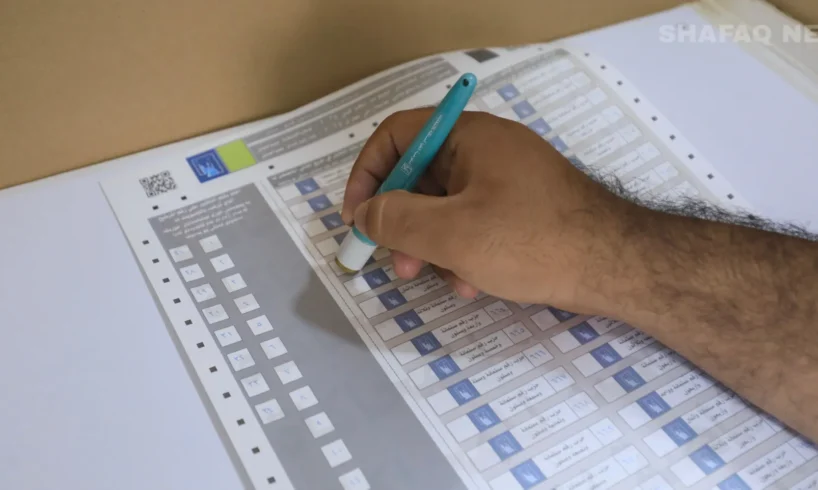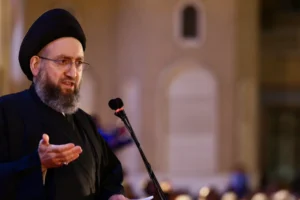
Shafaq News – Baghdad
Since Iraq’s first
elections after 2003, the dispute over the “largest parliamentary bloc” has
been the most decisive and contentious issue in every government formation. The
concept — born from a vague constitutional text and competing interpretations —
has evolved into a political weapon that dominant factions use to claim the
right to form the cabinet and secure the premiership.
As Iraq heads toward
its November 2025 parliamentary elections, this old conflict has reemerged at
the heart of the Shiite Coordination Framework, which is facing deep internal
divisions over who should lead the next government and how to ensure control of
the “largest bloc” — the constitutional key to forming it.
Repeated meetings
among Framework leaders have failed to produce a consensus, leaving tensions
simmering and raising concerns of a renewed political confrontation that could
mirror the deadlocks of previous years.
Read more: Iraq’s 2025 Elections: Shiite giants clash for Soul of the House
Between Law and Power
Analysts note that
the dispute goes far beyond legal semantics. It cuts into Iraq’s core power
structure, shaping alliances that often transcend sectarian and ethnic
boundaries. Each side seeks to maximize its influence within the executive
branch: some parties argue that the “largest bloc” must be determined after the
elections through parliamentary coalitions, while others insist it should be
the bloc that wins the highest number of seats at the polls — a divergence that
often triggers fierce post-election battles over numbers, loyalties, and
shifting alliances.
Rifts Inside the
Coordination Framework
A senior source
within the Coordination Framework told Shafaq News that internal disagreements
over forming the next government and choosing a prime minister have
intensified, with no final decision reached despite weeks of meetings.
“The Coordination
Framework aims to resolve the government formation more easily than in previous
elections,” the source said, “especially after the Patriotic Shiite Movement
-PSM [led by Muqtada Al-Sadr] withdrew
from the race and is not fielding candidates. Some leaders see this as a chance
to avoid past political complications.”
Al-Sadr had announced
in March 2025 that his movement would not participate in the elections, citing
“the spread of corruption and the corrupt,” and warning that “Iraq is breathing
its last.” He had earlier withdrawn from politics in June 2022, calling for the
resignation of his 73 lawmakers and vowing not to engage again “so as not to be
complicit with the corrupt politicians.”
According to the same
Framework source, discussions have included the “guaranteeing third” option and
possible alliances with Kurdish forces to pass the name of the next prime
minister. Yet the idea failed to gain consensus because of sharp internal
divisions.
The term
“guaranteeing third” — commonly used in Iraqi political discourse — refers to a
parliamentary alliance that controls more than one-third of the 329 seats (at
least 110 lawmakers). Such a bloc holds enough weight to block key
constitutional decisions, including electing the president of the republic or
granting confidence to a new government, effectively serving as a “blocking
third” in parliamentary negotiations.
The rift, the source
explained, revolves around three main factions: one loyal to Prime Minister
Mohammed Shia al-Sudani, another led by Nouri al-Maliki, head of the State of
Law Coalition, and a third backed by Qais al-Khazali, leader of Asaib Ahl
al-Haq. “These disagreements have created noticeable tension within the
Framework,” the source added, “amid fears that some factions — expected to win
significant seats — could form alliances with major Sunni and Kurdish blocs to
shape the next government independently.”
The source also noted
that no agreement has yet been reached on who will represent the “largest
bloc,” predicting that this issue will likely be deferred until after the
elections, when the real parliamentary balance of power becomes clear.
Read more: Al-Sadr shockwave: New uncertainty ahead of Iraq’s parliamentary poll
The Constitutional
Context
Iraq’s 2005
Constitution grants the right to form the government to the largest
parliamentary bloc, stating in Article 76(1): “The President of the Republic
shall charge the nominee of the largest parliamentary bloc with forming the
Council of Ministers within fifteen days of his election.”
Yet nearly two
decades later, disagreement continues over the meaning of “largest bloc.” Some
interpret it as the list winning the most seats; others view it as a coalition
formed after the elections that commands a majority in parliament.
On March 25, 2010,
the Federal Supreme Court clarified that the “largest bloc” could be either: A
pre-election coalition that competed under one name and number and won the most
seats; or a post-election alliance formed in parliament between two or more
lists that together constitute the majority.
That ruling shifted
the right to form the government away from Iyad Allawi, whose Iraqiya List won
91 seats in 2010, to Nouri al-Maliki, whose State of Law Coalition secured 89
seats but later built a broader parliamentary alliance.
The Key Challenge
After the Elections
Within the State of
Law Coalition, Haider al-Lami believes the “largest bloc” issue will be the
central challenge following the 2025 elections.
“This matter will
define the political struggle among the winning forces,” al-Lami told Shafaq
News. “The Coordination Framework is currently the frontrunner in resolving
this matter, given its powerful and influential components.”
He noted that there
is “a near consensus within the Framework on the need to handle this file
realistically, ensuring political stability and constitutional formation of the
government.”
Discussing the
“guaranteeing third,” al-Lami said this option remains on the table as a
possible solution if disputes over government formation or position distribution
escalate, though it has not been formally adopted. “Resorting to it will depend
on the level of consensus or division after the elections.”
He added that the
upcoming elections will be among the “most exceptional” since 2003, given the
intensity of competition and polarization. “The results may produce unexpected
alliances that reshape Iraq’s political scene.”
Al-Lami recalled that
in 2021, State of Law MPs Alaa Nsaif and Atwan al-Atwani had filed a lawsuit
before the Federal Supreme Court to recognize the Coordination Framework as the
largest bloc. The court dismissed the case a month later, confirming the
Sadrist bloc (recently labeled as PSM) as the largest after it won the highest
number of seats.
Read more: Iraq’s 2025 Elections: Revised law reshapes the path to power
The Framework Will
Remain the Guaranteeing Third
Inside the Framework,
Aqeel al-Rudaini, a member of the Victory Alliance (Al-Nasr), expressed
confidence in its political weight.
The Victory Alliance,
led by former Prime Minister Haider al-Abadi, announced its withdrawal from the
November elections, while remaining active in broader political discussions
within the bloc.
“The Coordination
Framework will remain the decisive force in Iraq’s political equation during
the next government formation,” he told Shafaq News, describing it as “the
guaranteeing third.”
Al-Rudaini added that
“there are signs Prime Minister Mohammed Shia al-Sudani may eventually separate
from the Framework.” However, “even if alliances form outside it, no group will
be able to form a government without coordination with or support from the
Framework.”
Commenting on reports
of a potential tripartite alliance between al-Sudani, Kurdish, and Sunni
parties, al-Rudaini said these reports are not confirmed, stressing that the
Framework will remain the political heavyweight and stabilizing force in Iraq,
regardless of new alignments after the elections.”
Post-Election
Alliances Will Define the Largest Bloc
From the Sunni camp,
Ahmed al-Jubouri of the Taqaddum Party, led by former parliament speaker
Mohammad Al-Halbousi, shared a different perspective.
“The question of the
largest bloc will continue to pose a political challenge even after the
elections,” al-Jubouri told Shafaq News. “Its formation depends on alliances
created after the results are announced and is not necessarily linked to
pre-election arrangements.”
He denied reports of
any prior agreement between Taqaddum and the Coordination Framework, stressing
that any understandings on this matter will only become clear once the final
results and new alliances are known.
Al-Jubouri added that
the 2025 elections could bring changes in seat distribution and coalition
structures, keeping the issue of the largest bloc open for negotiation. For
him, the post-election dialogues will be decisive in shaping the next
government and defining parliamentary alliances.
Written and edited by
Shafaq News staff.





